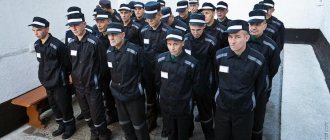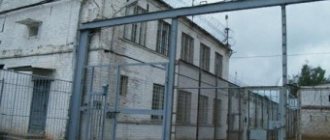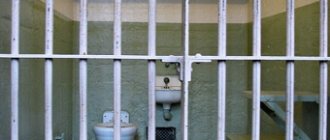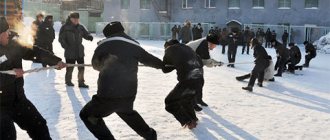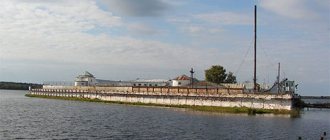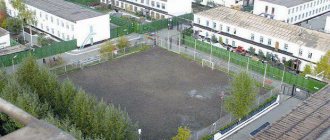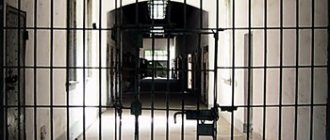I am a person who has never had close contact with court proceedings and various crimes before. I have no idea what a special regime prison is, or how criminals are kept in special regime colonies. I had to come into contact with this issue after my stepfather ended up in prison. I had to go there a couple of times to deliver the parcel. What I saw greatly surprised me, so I decided to write an article on this topic. After studying it, you can get answers to the following questions:
- The official definition and concept of a special regime colony.
- Basic conditions and rules of stay.
- Differences between a standard maximum security colony and a regular prison.
- Differences between modes.
- Which maximum security colonies operate in the Russian Federation.
General definitions
To completely or partially isolate a citizen who has committed an unlawful act, several types of correctional institutions have been created in the Russian Federation, most of which are colonies. There are three types of operating modes for such institutions:
- General.
- Special.
- Strict.
This division is associated with the variety of crimes committed, the personal characteristics of those convicted, and the varying severity of the acts. In general regime colonies, the conditions for serving a sentence in terms of loyalty are in second place, immediately after settlement-type colonies. A distinctive feature of the regimes is the availability of more freedoms for prisoners.
Types of crimes
The current Criminal Code in articles 120 and 121 regulates all processes related to correctional institutions with general regime. The peculiarities of correctional colonies with general regime lie in the content of convicts. Regulatory legal acts establish categories of citizens who can be sent to such institutions to serve their sentences:
- Criminals who intentionally committed an illegal act, but for the first time in their lives.
- Persons who violated the rules of detention in a more loyal settlement colony. By decision of the court, they are transferred to a general regime correctional facility.
- Convicts held in a correctional facility for persons under the age of majority.
- Women who have committed particularly serious crimes or relapsed.
- Male repeat offenders who have committed a crime falling into the category of moderate or minor gravity.
Who gets special treatment?
The most dangerous criminals are kept in special conditions.
Life imprisonment is given for crimes such as:
- aggravated murder;
- rape of a person under the age of 16 by a criminal who has already been convicted of a similar crime;
- terrorist attack;
- etc.
These conditions are assigned to criminals whose actions are directed against the interests of society and human life. Who is given a special regime - persons sentenced to life imprisonment.
The process of carrying out punishment
There are three content options:
- Strict;
- Ordinary;
- Light regime in a general regime colony.
Persons under a light or normal regime of detention are allowed to live in the same area.
All convicts subject to strict conditions of detention are kept separately from other convicts in isolated premises.
Initially, all convicts are placed under normal conditions of detention. During the process of serving the sentence, based on the behavior of the convicted person, a special commission decides to transfer him to another regime of detention. This possibility, as well as situations in which a transfer to another mode of serving a sentence is allowed, is regulated by Penal Code Article 120.
To change the conditions of detention of a convicted person to more lenient ones, he must fulfill the following requirements:
- Do not violate the rules of detention in a correctional institution.
- Carry out all production tasks conscientiously.
- Serve the sentence in a colony under general conditions for at least six months.
The basis for transfer of a person sentenced to strict conditions of detention may be a malicious violation of order in a correctional institution, which can be expressed:
- Drinking alcoholic beverages.
- Distribution or use of drugs.
- Initiating a strike.
- Other illegal acts.
The prisoner can be returned to normal detention after 6 months, but only if there are no new violations. Another correctional measure is the performance of various types of work by convicts.
Thanks to their work activities, lawbreakers become socially active, and the money they receive is spent on their personal needs or sent to their relatives as financial assistance.
general information
The concept of a correctional colony
A correctional colony means an institution designed to imprison criminals.
A general regime colony and a strict regime colony imply the residence of prisoners in premises designed for joint living. The minimum floor area per prisoner is 2 square meters for men and 3 square meters for women.
Such correctional colonies are often called zones, due to the fact that these institutions are zoned into separate territories:
- The industrial part where convicts carry out labor activities.
- The residential part in which criminals live and eat, participate in cultural events, study, receive medical care, and wash. The residential part includes an administrative complex.
- The local part, which is used for prisoners' walks.
Peculiarities
Isolation from the outside world is carried out using a fenced perimeter, which is constantly guarded using guard buildings and patrols operating on the premises. To stop escapes and any illegal actions, CCTV cameras are additionally used. Attention! Correction of persons imprisoned in such institutions is carried out through the use of retribution measures aimed at facilitating the conditions of detention of guilty persons who comply with the rules of detention, act in accordance with the schedule and obey all the requirements of the colony management.
Conditions of serving the sentence
There are no absolutely identical correctional institutions; each of them has its own distinctive features that must comply with established rules.
Daily regime
The administration of each correctional complex has the right to draw up a daily routine for citizens serving sentences, but on the condition that it does not contradict current legislation. One of the mandatory conditions of any schedule is continuous sleep for convicts for 8 hours every day. Approximate schedule:
| Actions Performed | Start time |
| Getting up, hygiene procedures, physical warm-up | 6:00 |
| Eating | 7:00 |
| Beginning of work. Day length can be 8 or 12 hours | 8:00 |
| Eating | 13.00 |
| Continuation of work | 13:30 |
| Eating | 20:00 |
| Free time | 20:30 |
| Lights out | 22:00 |
Other schedules are developed for weekends, in which most of the time is devoted to the education and training of prisoners.
Have a question for a lawyer? Ask now, call and get a free consultation from leading lawyers in your city. We will answer your questions quickly and try to help with your specific case.
Telephone in Moscow and the Moscow region: +7
Phone in St. Petersburg and Leningrad region: +7
Free hotline throughout Russia: 8 (800) 301-39-20
Eating
In each general regime colony, the administration is obliged to organize meals for prisoners 3 times daily. All prisoners have breakfast, lunch, and dinner in blocks specially designated for these purposes. During meals, guards and representatives of the administration are present in the dining room. A special diet is developed for prisoners, which is as balanced as possible and includes the elements necessary for full life.
Providing clothing
Each prisoner admitted to the colony is given a special uniform, which will be the main outer clothing. Convicts are not prohibited from having their own personal belongings:
- T-shirt.
- Socks.
- Underpants.
- Shoes.
- Hats.
- Gloves.
Time for rest and entertainment
Entertainment in a prison colony:
- Library equipped.
- There is one common TV installed.
Conversations between prisoners on free topics are not prohibited, but only during free time from work. As a form of recreation, persons serving sentences are provided with daily walks in the fresh air. For persons who have been transferred to a stricter regime of detention, the walking time is reduced to 1.5 hours.
Labor activity
In general regime colonies, conditions for all convicts provide for compulsory labor activity. Even if the convict does not have any professional skills, he will be provided with a job in the colony. If the prisoner expresses a desire to undergo training, the administration of the institution will provide such an opportunity, if provided for by the conditions of the colony.
Most often, workshops, tailoring or welding workshops are organized on the territory of the colonies. Convicts in the colony can perform work only outside the colony territory.
Learning process
Not all persons serving a sentence in a general regime correctional facility need to undergo training. But if a convicted citizen wants to obtain a higher or basic education, such a right is established by the PEC.
Visiting a Prisoner
Everyone serving a sentence in a colony has the right to meet with relatives. The number of permissible meetings directly depends on the regime of detention of the convicted person.
| Conditions of detention | Number of dates per year | |
| Long | Short | |
| Regular | 6 | 4 |
| Lightweight | 6 | 6 |
| Strict | 3 | 3 |
Permitted transfers and expenses
The number of parcels for convicts also depends on the conditions of detention in a general regime colony
| Conditions of detention | Number of transfers from relatives per year | |
| Parcels | Parcels | |
| Regular | 6 | 4 |
| Lightweight | 12 | 12 |
| Strict | 3 | 3 |
Each convict working on the territory of the colony receives a monetary reward, which accumulates in his personal account. The amount that a convicted person can spend monthly from the accumulated fund also depends on the regime.
| Conditions of detention | Maximum allowed amount of spending per month in rubles |
| Regular | 9 000 |
| Lightweight | Any amount |
| Strict | 7 800 |
Comparative characteristics
What is the difference between a strict regime and a general regime? The answer to this question is spelled out in Articles 121 and 122 of the Penal Code. A number of restrictions are imposed on convicts of both regimes. This is manifested in the amount of money that can be spent on food and personal hygiene items, in the number of visits provided, and in the receipt of parcels, packages and parcels.
But in a strict and general regime, the perpetrator may be in ordinary, strict or light conditions. This will depend on himself, on his desire to work and improve.
Specifics of serving sentences for women
Women and men are kept in the colony separately from each other. Unlike men, convicted women serve their sentences in the same room without separation depending on the severity of the crime committed. There are no fundamental differences between the conditions of detention of men and women in the colony. They must work, have set free time and the opportunity to receive parcels and meet relatives.
A special feature of women's colonies is the established schedule. Each of the convicts must be on duty and clean the barracks.
A woman, regardless of the severity of the crime committed, is not given a life sentence. The maximum possible sentence for female criminals is 35 years.
Meetings with relatives
Everyone serving a sentence in a general regime penal colony has the right to meet with relatives. For these purposes, there is a special room on the territory of the colony, which is equipped with a telephone. After the meeting is completed, the relatives are taken on a special bus outside the colony, and the convicted person is sent back to his cell under escort.
What is it and are there any differences from other ICs?
In Russia, there are four types of correctional colonies (CIs) for convicts: settlement colonies, regular regime, strict regime and special regime. Let's consider how special regime IR differs from other MLS, for example, from strict regime IR.
Special regime correctional colonies have the most stringent conditions for keeping prisoners . This includes those sentenced to life imprisonment and repeat offenders on particularly serious charges. Prisoners sentenced to death are also held in special colonies.
- The largest Russian special regime colony is “Black Dolphin” . According to 2022 data. 733 people are imprisoned here, but this is far from the limit, because the total capacity of the correctional colony is 1,600 convicts. Even with a prison population half the maximum, Black Dolphin employs more than 900 correctional officers.
- "Polar Owl" is the northernmost prison in Russia. IK is located in the polar Urals, and is the last refuge for life prisoners. For most of the year, the temperature in these parts does not rise above -40 degrees, for this reason the “Polar Owl” is considered a colony with the most difficult living conditions. By 2022, 458 prisoners are being held on the territory of the penal colony.
- Another high security penitentiary institution is "White Swan". A correctional colony famous for its strictest regime. Despite the fact that prisoners sentenced to life imprisonment are kept here, the average term of serving a sentence is 3-7 years (according to unofficial data, prisoners no longer live). The reasons for this may be different:
- illness;
suicides;
- mental illness, when prisoners withdraw into themselves and refuse food.
One of the versions of why the penal colony is called “White Swan” talks about the way convicts move around the territory: leaning forward almost 90 degrees, they walk with their arms thrown behind their backs, like a swan.
We talk in more detail about the main differences between Russian correctional institutions in a separate material.
Direction to a colony settlement
Every convict serving a sentence in a general regime colony has the right to file a petition to consider transfer to a correctional institution with milder conditions - a settlement colony. The main requirement that must be met before submitting such an application is the period of serving in a general regime colony:
| Part of the sentence | For which persons is it intended? |
| 1/3 | For convicts |
| 1/2 | After being released on parole, he committed another crime |
| 2/3 | For persons who have committed a serious crime |
Schedule
Each correctional institution has an established daily routine for convicts serving their sentences. The rules established by the procedure are strictly regulated and mandatory for all prisoners. When developing a prisoner's daily routine, various factors are taken into account:
- Specifics of work.
- Terrain conditions.
- Season.
- Other circumstances.
A standard daily routine includes the following:
- Climb.
- Lights out.
- Hygiene procedures.
- Physical exercise.
- Eating.
- Labor activity.
- Training sessions.
- Educational activities.
- Leisure.
The daily routine provides acceptable time intervals for each item. Continuous sleep for 8 hours. Eating no more than half an hour. Personal time and leisure up to one hour.

